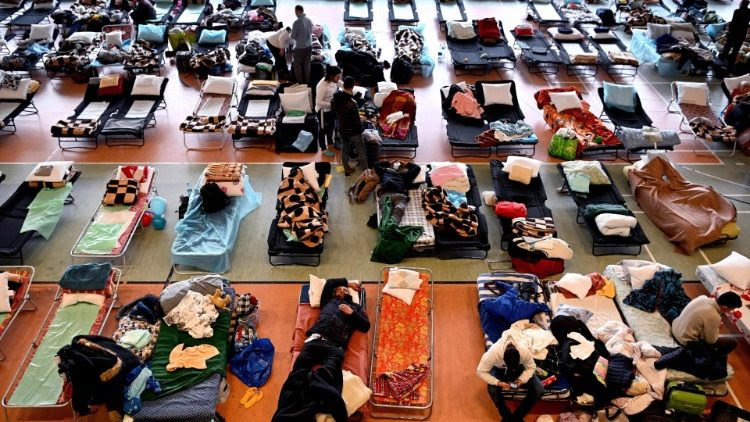The sight of millions of refugees, mostly women and children, fleeing Ukraine has generated a tremendous outpouring of sympathy worldwide. In Poland, which welcomed 1.4 million of them, and elsewhere in East-Central Europe, ordinary people are stepping forward with donations of food, clothing, toys and baby carriages. Many are opening their homes to complete strangers.
These are simple acts of charity, not multimillion-dollar aid programs administered by NGOs and well-paid international bureaucrats, yet they are highly appreciated – and they make a big difference in the lives of the recipients. It’s a reminder that simple solutions, organized by parish priests or laymen, can sometimes be the most effective.
Longer-term, of course, Ukraine’s refugees will need more organized forms of aid to provide services like schooling, healthcare, and job training. But the lesson of the immediate crisis is worth remembering.
Think about mental health. Ukrainians, especially children, are experiencing horrific trauma for the second time in just two years. The lockdown measures and school closures instituted to contain the pandemic left many children and youth feeling lonely and isolated.
The prevalence of depression and anxiety doubled during Covid-19, according to a meta-analysis of studies that included more than 80 thousand youth globally. One in four experienced clinically elevated depression symptoms, and one in five had elevated anxiety symptoms. In Europe, a study found evidence that higher rates of stress, anxiety, and depression disproportionately affected the young.
Yet here again, simple solutions – rather than expensive and elaborate campaigns touted by media celebrities – may be part of the answer.
Alysha Tagert, an American therapist who works with people suffering from anxiety, depression, and post-traumatic stress, suggests that young people assemble a “coping tool box.” This is literally a container with items that can help children soothe themselves in a time of panic or anxiety.
She suggests having children take part in assembling the tool box to give them a sense of comfort and control. The box would include everyday items, each with a specific sensory role: A stuffed animal or a weighted cushion to support the body’s awareness of itself; a fidget spinner or a stress ball to keep the hands occupied; a pinwheel or a bottle of bubbles for relaxation and breathing.

War refugees from Ukraine are housed at a school in Medyka, Poland, near the Polish-Ukrainian border.
Items could also include a calming oil, for olfactory sensory support; a jump rope or book of yoga poses that requires physical movement; a puzzle or a book that requires thought or concentration; something for oral motor sensory support, such as sugar-free chewing gum; and something visually soothing such as an hourglass.
We know that emotional well-being is linked to overall physical health, a point so obvious that the WHO has “there is no health without mental health” on its homepage. As a concrete example, a Korean study of 1,204 elderly men and women suffering from depression and anxiety showed they were at higher risk of developing heart disease, hypertension, and asthma.
Similarly, poor oral health has been associated with a host of maladies such as atherosclerotic vascular disease, pulmonary disease, diabetes, and premature births. As with the toolbox for coping with anxiety, simple and inexpensive solutions – such as regular brushing, visits to the dentist, or even chewing sugar-free gum – can be effective not just in keeping the smile looking healthy but also in preventing more serious problems.
To put the power of simple and inexpensive solutions in perspective, a recent pregnancy study in East Africa, where poverty limits access to quality health care, found that chewing sugar-free gum twice a day significantly lowered the risk of preterm birth – at a total cost of $41 per pregnancy.
In his famous The White Man’s Burden, economist William Easterly described how the West spent $2.3 trillion in foreign aid to poor countries over five decades but was unable to distribute $4 mosquito nets to prevent malaria in Africa. He contrasted the “planners,” people with grand ambitions who take no responsibility for results, with “searchers” – people who find out what’s needed on the ground and deliver it.
That book was published in 2006. Today, we still need more searchers and fewer planners – and we need to appreciate the charity of simple solutions.
-------------------------------------------
By: Nicholas Waller
Title: Simple acts of human charity
Sourced From: www.neweurope.eu/article/simple-acts-of-human-charity/
Published Date: Thu, 10 Mar 2022 14:51:27 +0000
Read More
Did you miss our previous article...
https://badpoliticians.com/uk-politics/pessimism-over-what-comes-next
 UK PoliticsWorld PoliticsVideosPrivacy PolicyTerms And Conditions
UK PoliticsWorld PoliticsVideosPrivacy PolicyTerms And Conditions
